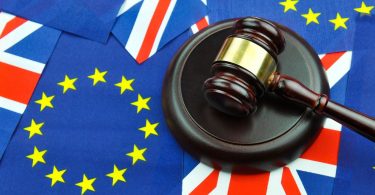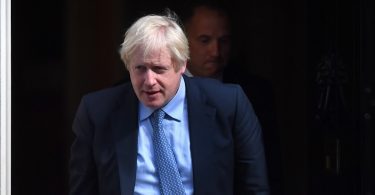by Martin Howe QC, Chairman of Lawyers for Britain. Here he expands on the points first put forward in an article on 10 September 2020 in the Daily Telegraph “Forget the foaming indignation, this Brexit bill is perfectly justifiable. Despite Brandon Lewis’ rather puzzling remarks, there are good arguments that the government’s clauses will not breach international law” (behind paywall)
The United Kingdom’s Internal Market is part of our Constitution
A single unified internal market is a key block in the constitutional foundations of the United Kingdom. The 1707 Articles of Union between England and Scotland, and those between Great Britain and Ireland in 1800, abolished all customs duties between the different parts of the United Kingdom. Article VI of 1800 also declared that:
The subjects of Great Britain and Ireland shall be on the same footing in respect of trade and navigation, and in all treaties with foreign powers the subjects of Ireland shall have the same privileges as British subjects.
From January 1, 1801, all prohibitions and bounties on the export of articles the produce or manufacture of either country to the other shall cease.”
Free and uninterrupted commerce across all parts of the newly-united Kingdom, coupled with having uniform external customs and trade relations with foreign countries, were seen as one of the most important advantages of the Acts of Union, particularly in Scotland and Ireland, whose citizens could freely trade into and out of the larger English market.
These advantages have been the embedded and accepted norm across Great Britain for over 300 years, and across Great Britain and Ireland (although later restricted to Northern Ireland) for over 200 years. Because the advantages of free trade within a single internal market across the UK are so long established, it is easy to overlook how important they were at the time they were established and how detrimental it would be in both economic and political terms for them to be undermined or restricted.
It is no coincidence that Britain was the birthplace of the Industrial Revolution, at a time when pre-Revolution France crippled its economic development with internal customs duties and tolls on goods between different provinces, and when Germany was splintered into numerous princely states with their own taxes and customs duties. Industrial development in Germany was able to take off with the establishment and expansion of Bismarck’s Zollverein (customs union) from 1834 onwards.
When Ireland was partitioned and the separate Parliament of Northern Ireland was established, the Westminster Parliament was careful to ensure that Northern Ireland and Great Britain should continue to remain a single integrated internal market, and that the principles of the 1800 Articles of Union should continue to apply as between them.
The legislation establishing that Parliament (the Government of Ireland Act 1920) carefully preserved the unity of the single United Kingdom internal market. Notably, subs 4(1) specified that the following matters were reserved to Westminster:-
(7) Trade with any place out of the part of Ireland within their jurisdiction, except so far as trade may be affected by the exercise of the powers of taxation given to the said parliaments, or by regulations made for the sole purpose of preventing contagious disease, or by steps taken by means of inquiries or agencies out of the part of Ireland within their jurisdiction for the improvement of the trade of that part or for the protection of traders of that part from fraud; the granting of bounties on the export of goods; quarantine; navigation, including merchant shipping (except as respects inland waters, the regulation of harbours, and local health regulations);”
The reservation in (7) above prevented the Parliament of Northern Ireland from imposing import or export bans or restrictions (other than in the limited respects set out for e.g. preventing “contagious disease”) which would affect trade with other parts of the UK or abroad. The prohibition against the Parliament of Northern Ireland making laws for “the granting of bounties on the export of goods” (what in modern terms would be called State aid for exporters) showed that the Westminster Parliament in 1920 recognised that the devolved powers of the Parliament of Northern Ireland should not extend to measures which would disrupt or distort trade, reflecting the continuing application of the principles in Art.VI of the Articles of Union between Great Britain and Ireland.
The devolved legislatures in Scotland and Wales were created after the UK had joined the EC (now the EU). Because the EU single market rules on free movement of goods and services and on State aids apply to regional governments and legislatures as well as the central governments of Member States, there was no pressing need during our EU membership for specific UK-based rules maintaining the UK internal market against fragmentation. (Although section 26(4)(b) of the Northern Ireland Act 1998 did provide powers for the Secretary of State to revoke Assembly legislation which “would have an adverse effect on the operation of the single market in goods and services within the United Kingdom“.)
Now that we have left the EU in name, and will leave its internal market in substance on 31 December this year, the government’s UK Internal Market Bill is needed to maintain the free flow of trade across the nation in the post-Brexit world. Despite predictable protestations from the Scottish nationalists, the Bill’s restrictions on the powers of the devolved legislatures are less than those under EU law (which for unaccountable reasons the nationalists seem to love so much). It is clearly necessary in an open internal market to have rules which prevent devolved legislatures or local authorities from subsidising local businesses in ways which would unfairly damage businesses in other parts of the country, or from creating regulations which have the effect of preventing goods made in other parts of the UK from being freely imported or sold in their territories.
But two clauses in the Bill have generated torrents of foaming indignation. These would allow the government to restrict the so-called “direct effect” of two parts of the Northern Ireland Protocol, which is part of the EU Withdrawal Agreement (WA). The government will also include a similar clause in the Finance Bill in order to prevent the Protocol being weaponised by the EU to require the wholesale imposition of EU tariffs on all goods sent from Great Britain to Northern Ireland.
These clauses have the purpose of protecting the basic functioning of the United Kingdom’s internal market as it operates between Great Britain and Northern Ireland in the event that it is not possible to reach an agreement with the EU on the UK’s future relationship with them, and of allowing State aid in Great Britain to be dispensed under a framework of rules devised in this country and set out in the UK Internal Market Bill, rather than being subject to EU Commission control and ECJ jurisdiction.
What is the threat if these clauses are not passed into law?
Torrents of foam which have been pouring out from over-heated lawyers and unreconstructed Remain-supporting politicians about the claimed sanctity of “international law”, but there has been little sign of any degree of realisation or acknowledgment of the extremely serious consequences for the United Kingdom generally, and for the people of Northern Ireland in particular, that could automatically ensue if these clauses are not passed into law.
In order to understand those consequences and the reasons why they will arise, it is necessary to understand the relationship between international treaties and UK domestic and constitutional law, and the consequences of “direct effect” of a treaty.
International treaties and UK internal law
Under the UK’s constitutional law, international treaties in general do not form part of the law. Where an international treaty has made it necessary to make changes to the UK’s internal law in order to comply with it, the general practice has been for Parliament to pass legislation to make any necessary changes to the law. Parliament is not obliged to pass such legislation and is under no legal duty to do so, although Members of Parliament would need to consider the political consequences if their refusal to pass legislation leads to the United Kingdom becoming in breach of its international legal obligations.
In rare and exceptional cases however, Parliament has legislated to make international treaties have direct effect under internal UK law. One of those exceptional cases, and one of huge importance, has been the original Treaty of Rome and the subsequent EC/EU Treaties, which Parliament legislated to give direct effect through the wording of section 2(1) of the European Communities Act 1972:-
General implementation of Treaties.
2 — (1) All such rights, powers, liabilities, obligations and restrictions from time to time created or arising by or under the Treaties, and all such remedies and procedures from time to time provided for by or under the Treaties, as in accordance with the Treaties are without further enactment to be given legal effect or used in the United Kingdom shall be recognised and available in law, and be enforced, allowed and followed accordingly; and the expression “enforceable EU right” and similar expressions shall be read as referring to one to which this subsection applies.”
This wide ranging “direct effect” provision meant that not only the EU Treaties themselves, but numerous subordinate instruments made under them such as EU Regulations, Commission decisions, and European Court of Justice (ECJ) judgments, also directly formed part of the legal rules enforceable in UK courts.
And in a provision which was not merely rare but unique, Parliament legislated in section 2(4) of the 1972 Act to give the EC/EU Treaties and subordinate instruments made under them so-called primacy or supremacy over all laws of domestic origin, even over Acts of Parliament. This was understood by specialist lawyers, but few politicians appreciated the consequences of this doctrine or its power until the well-known Factortame series of cases led to the striking down of the Merchant Shipping Act 1988 in the UK courts following a ruling by the ECJ that it conflicted with the EC Treaty.
Having UK law subordinated to EU law and to ECJ rulings was one of the main drivers leading to the British people’s decision to leave the EU. It is therefore regrettable that the doctrines of supremacy and direct effect were carried forward into the Withdrawal Agreement, to continue to be applied to the UK for indefinite and potentially lengthy periods of time. Not only were these doctrines incorporated, but extraordinary jurisdiction clauses were meekly accepted by Theresa May’s government under which a court of one party (the ECJ) was given extensive jurisdiction over the supposedly sovereign other treaty party. These jurisdiction clauses represent a gross departure from normal international treaty practice under which sovereign states simply do not accept binding rulings by the courts of the other treaty party, and only agree to subject themselves to neutral international courts or tribunals.
Why “direct effect” of the Withdrawal Agreement (WA) matters
Under Article 4 of the WA, the WA itself and its Protocols including the Northern Ireland Protocol (NIP) are required to be given direct effect under internal UK law, and to be given supremacy over all other UK laws. Further, the EU law and EU law concepts which they continue to apply to the UK must be interpreted in accordance with rulings of the ECJ.
Although section 2(1) of the 1972 Act giving direct effect to the EU treaties will cease to have force at the end of the transition period on 31 December 2020, after that date the WA and the NIP will continue to be given direct effect and supremacy as a matter of UK law by virtue of section 7A of the European Union (Withdrawal) Act 2018. That section was inserted into the 2018 Act by section 5 of the EU (Withdrawal Agreement) Act 2020, and is in terms in substance identical to the corresponding section 2 of the 1972 Act.
The combined effect of Article 4 of the WA and of section 7A of the UK Act means that key parts of the WA and of the NIP are already part of domestic UK law and will automatically come into effect after 31 December 2020. As UK law now stands, ministers have no legal power to prevent them having effect as part of UK law, or to stop HMRC or the civil service from applying them or to stop the courts from enforcing them.
The potentially drastic or even catastrophic consequences of this can been seen from the specific examples which the government seeks to address with its clauses, as well as other dangers which the government has hinted it may need to legislate against in future.
(1) State aids in Great Britain caught by Article 10 of the NIP
Article 10 of the NIP applies the EU State aid rules listed in Annex 5 of the Protocol (effectively the whole corpus of EU State aid laws and EU Commission rulings and interpretations of EU State aid law and policy) to “the United Kingdom”. In this regard it differs from other Articles in the NIP which apply only to “the United Kingdom in respect of Northern Ireland“, i.e. only to NI territory. Instead of limiting the State aid rules by territory, Article 10 contains a functional test which requires the EU State aid rules to be applied “in respect of measures which affect that trade between Northern Ireland and the Union which is subject to this Protocol.”
The problem with this drafting is that the ECJ has given a very wide interpretation under existing EU State aid law to the concept of aid affecting trade between Member States (which is a requirement for EU State aid rules to be applicable). It seems likely that the EU will wish to interpret the concept of affecting trade under the Protocol (i.e. affecting trade between NI and the EU27) in the same way as the concept of affecting trade between Member States under existing EU State aid law.
The problem is that under this test, a merely potential or theoretical effect on trade is sufficient. And once a measure falls within the very wide ambit of the ECJ test, it is compulsory to notify the measure to the European Commission who have wide discretionary powers to block it or at best delay it. In view of the direct effect given to Art.10 of the NIP, a measure contended to be State aid (e.g. by a competitor) could be blocked by an injunction in the UK courts until a lengthy Commission notification and decision process has taken place, which might or might not lead to approval. Given the EU and the Commission’s perceived self interest in suppressing the competitiveness of post-Brexit Britain, it is extraordinary dangerous to place these highly discretionary powers in the hands of the Commission.
And because of supremacy of the WA and Protocol over UK law, the obligation to notify and the suspension of the measure by an injunction in UK courts could apply even if the measure concerned was in an Act of Parliament – for example, a GB-wide tax relief in a Finance Act. And UK courts (including courts in mainland GB) would be required under the Protocol to follow ECJ jurisprudence on this issue treating it as binding, and the Supreme Court would be compelled to refer any doubtful points of interpretation to the ECJ.
Trade under the Protocol means not just trade across the Irish land border which is small in volume, but all trade in goods between NI and any part of the EU27. Thus, a subsidy given to a car plant in Sunderland which allows that plant to ship cars to the whole UK market including Northern Ireland more cheaply, so competing with German cars in NI and potentially affecting German to NI exports, could be construed by the ECJ as falling within the scope of Article 10 and be notifiable to the EU Commission.
(2) Tariffs on all goods sent from Great Britain to Northern Ireland
The Protocol sets out the clear principle that NI is part of the customs territory of the UK, so goods should be allowed to flow from Great Britain to NI without tariffs. However, there are provisions requiring the UK authorities to levy EU tariffs on goods which are “at risk” of crossing the open border into the EU, with the idea that the tariffs would be refunded later if it is proved that the goods have been consumed within NI. The problem is that the circumstances in which goods are to be treated as “at risk” are not defined in the Protocol, and joint agreement is needed with the EU on the rules which would define this.
The EU has strong incentives to insist on a very wide definition of goods at risk, both because of its genuine but excessive paranoia about duty free goods leaking into the EU internal market, but also because it has a strong economic incentive to make life a difficult as possible for British based exporters of goods into NI in order to give an advantage over them to the EU’s own exporters in the Republic and elsewhere. The problem is that if the UK refuses to agree a wide definition and insists on a more limited class of goods genuinely at risk of onward sale into the EU, then the default position if there is no agreement appears to be that ALL goods passing from GB to NI would be subject to duties.
Even if there were a theoretical right to claim rebates, an across-the-board tariff collection exercise on goods moving from GB to NI would entail huge costs and is likely to cause chaos. For example, some major supermarket chains have integrated supply systems extending throughout the UK. If they were required to fill in customs declarations for all goods which they send from warehouses in GB into stores in NI, it would impose intolerable burdens. Unlike international cargoes, typical supermarket delivery lorries will contain large numbers of different types of goods, falling into many different customs tariff categories. The EU’s Common External Tariff has tens of thousands of “tariff lines” imposing different tariffs on different kinds of goods, and on top of that it has complexities known as “Meursing Tables” to compute tariffs on composite goods which only a few experts even understand.
The problem is that the NIP applies EU Customs law to Northern Ireland, including the Union Customs Code (UCC) Regulation (EU) No 952/2013. The UCC as an EU Regulation is directly applicable within EU Member States, and because of the combined effects of Article 4 of the WA and the NIP, it will remain directly applicable within Northern Ireland. For this reason, HMRC take the view (correctly) take the view that they are legally bound to implement and apply the UCC as if it were contained in an Act of Parliament and they cannot accept orders from ministers not to enforce it or to enforce it in a way which does not conform with their own legal advice as to its correct interpretation.
This fundamental problem caused by direct effect seems simply not to be understood by many media and political commentators, who wrongly assume that the government could refuse to implement the NIP in this way and then wait for the EU to complain. The position is that unless UK law is changed to modify or override the direct effect of the NIP, these disastrous consequences will happen come what may with Ministers powerless to prevent them.
(3) Export declarations on all goods sent from NI to GB
There is no requirement under the NIP for tariffs or other restrictions (such as regulatory restrictions) to be imposed on goods sent from NI to GB. The EU has no interest in the control of such goods. The UK could, for example, quite happily choose to continue to allow the importation of goods from NI into GB even if they fail to meet UK standards because of a divergence in regulatory laws.
However, the UCC requires export declarations to be made on the export of goods from EU territory. If the NIP is interpreted as making the NI to GB border an external EU border for the purposes of the UCC, then businesses exporting from NI to GB would be faced with huge and seemingly pointless administrative burdens when at the moment they can simply put the goods on the back of a lorry.
Again, this is an issue where, because of direct effect and the direct applicability of the UCC, ministers are powerless under UK law as it present stands to prevent this idiocy taking place if HMRC’s advice is that the NIP requires these declarations to be made.
(4) Regulatory barriers on the movement of goods from GB to NI
This is the area where the greatest long term problems under the NIP will develop. Because the NIP requires Northern Ireland to be subject to EU goods laws now and as they are amended in the future (without having any right to vote on those laws), the laws relating to the sale and marketing of goods in the rest of the UK will progressively diverge from those in NI. If such divergence does not happen, e.g. because the whole UK slavishly follows EU laws as they change, it would make Brexit pointless of worse – still effectively bound to follow EU rules but losing our right to vote on them.
As this process happens, more and more goods on the market in GB will become illegal to sell in NI. For example, if the UK decides to push forward with AI based autonomous cars in a way which is not allowed by the EU’s technophobic rules, it would not be possible to sell those cars into NI.
That is the long term effect. But an immediate and dramatic problem is looming into sight on 1 January 2021. It had wrongly been assumed that because the UK’s laws will be the same as the EU’s on 1 January and divergence would only happen gradually thereafter, there would not be regulatory barriers at first to goods continuing to flow from GB to NI (or indeed the other way).
However, this blasé view ignores the areas of EU law where it is necessary for the EU to grant approvals for imports from outside the EU. The UK negotiator David Frost has made it clear that EU negotiator Michel Barnier threatened that, in the event of a “no deal” on the future relationship, the EU could withhold so-called third country recognition for the importation of food and agricultural products from the UK. In addition to blocking food exports from the UK into the EU27, this WTO rules breaching step would also have the automatic effect of under the NIP of rendering unlawful the importation of food from GB into NI. Again, because of direct effect, the UK and in particular the peopled of Northern Ireland would remain spreadeagled and powerless to deflect this threat under UK law.
Even if this particular threat (withholding of third country recognition to imports from the UK) is not carried out, there are other serious problems. One of those is caused by goods labelling rules. This is a problem of labyrinthine complexity. Even though goods on the UK market in 2021 will still substantively conform with EU rules, it seems that in many areas the labelling rules will be different so that goods labelled for the UK market will not be sellable in the EU and vice versa. This has the automatic consequence under the NIP, with direct effect, that goods lawfully labelled for the UK and on the market in GB will become unlawful to sell in NI.
It is tempting to dismiss labelling issues as trivial, but they are not. Consider for example a supermarket chain with many different lines of goods on sale in stores throughout the UK which are supplied through an integrated distribution system. If different labelling rules apply to goods sold in NI stores from goods sold in GB stores then the supermarket would have to buy and hold two separate stocks of each kind of goods, and keep them separate in the distribution system. Where (as frequently happens) goods are actually packaged and labelled by suppliers, it would be necessary for the suppliers to be told to apply two different kinds of labels and keep stocks of the delivered goods separate from each other.
Again, direct effect means that it may simply be impossible under UK law to prevent this chaos. Although it would be possible to amend UK law to allow EU-labelled goods to be sold in GB at least as a transitional measure, the UK government and indeed Parliament are powerless to modify labelling laws within NI as the law stands at present.
These are threats to the constitution of the United Kingdom
As we have seen, the freedom to trade between different parts of the United Kingdom, and in particular to trade without customs duties or “prohibition” (i.e. regulatory barriers), is one of the foundations of the UK’s constitution.
Were these threats to materialise, that would be flat contrary to the Act of Union between Great Britain and Ireland and would alter the constitutional status of Northern Ireland within the UK. As such, it would amount to a major breach of the core principle of the Belfast (Good Friday) Agreement that NI’s constitutional status cannot be changed without the consent of the people of Northern Ireland.
These problems arise from sloppy and hurried drafting of some of the clauses in the Protocol, coupled with the egregious clauses in Theresa May’s atrociously negotiated Withdrawal Agreement which purport to impose on the UK the EU law concepts of “direct effect” of treaties and the WA’s supremacy over domestic law. Leaving aside the justification of these doctrines as they apply to Member States (who at least have a vote on the content of the EU laws which apply to them), Theresa May’s Withdrawal Agreement was quite extraordinary in conceding the continuation of these powers to the EU even after the UK had left. It was even more extraordinary to have conceded giving the European Court of Justice binding powers of interpretation. These clauses simply defy universal international treaty practice, under which a sovereign state never subjects itself to binding rulings by courts of another treaty party.
Given its duties to safeguard the constitution and internal market of the United Kingdom and its specific responsibilities under the Belfast Agreement, the UK government cannot possibly allow these threats to materialise into actuality it is therefore essential for powers to be taken which allow if necessary direct effect to be over-ridden under UK law.
The UK constitution and international law
As a matter of UK constitutional law, the UK Parliament is entitled to legislate to remove direct effect from part of – or indeed (if it so chose) the whole of – an international treaty such as the WA and its NI Protocol. International treaties have no force at all in UK domestic law, unless and until Parliament chooses to give them such force – which it can revoke at a future date if it chooses.
In this particular case, the right of Parliament to override the direct effect of the WA is made clear within the very same Act – the EU (Withdrawal Agreement) Act 2020 – which inserted the section 7A on direct effect and supremacy into the 2018 Act as explained above. Parliament also enacted section 38 of the 2020 Act, the so-called sovereignty clause championed by Sir Bill Cash MP. Section 38(1) expressly mentions section 7A as one of the provisions over which the sovereignty of Parliament will prevail.
The government’s clauses in the UK Internal Market Bill (clauses 42 and 43) will do exactly that, by authorising ministers to make regulations which would disapply or restrict the operation under UK law of the direct effect of the parts of the NIP which would impose export declarations or other formalities on goods passing from NI to GB, or would impose EU State aid controls on GB.
A similar clause is expected to be included in the Finance Bill to disapply the direct effect of requirements to impose tariffs on goods passing from GB to NI. Regarding regulatory restrictions on goods exported from GB to NI, there is nothing in the current Bill but the government has indicated that it will legislate if necessary.
But while Parliament is supreme and all these provisions will be lawful and effective in UK domestic law, Parliament cannot legislate to alter the UK’s international legal obligations. This is what has given rise to much of the angst among lawyers and others, with phrases being used such as that the government is “breaking the law.”
The first point to note is that there is no comparability between the concept of “breaking the law” in the domestic law context where someone acts in breach of a legal duty defined by the law and giving rise to legally defined penalties or other consequences, and the behaviour of States in the international arena regarding their adherence to treaties.
The principle that States should observe treaties which they sign is one which arises from the practice of States, and is subject to a number of recognised exceptions. Framing domestic law in a way which may arguably breach international treaty obligations in order to maintain a negotiating position is a technique employed widely by states in their international relations, and also by the EU itself. The EU has a long history of disregarding adverse rulings by WTO disputes bodies, for example on subsidies to Airbus.
The ECJ itself in a case called Portugal v Council (Case C-149/96) decided that it should not give any direct effect to the WTO Agreements under EU law, because that would force compliance with the WTO obligations and so have the consequence of depriving the EU’s legislative or executive organs of the possibility entering into negotiated arrangements. The Council of Ministers decision which gives effect under EU law to the WTO Agreements expressly purports to deny direct effect to them within the EU legal system.
So if the government’s Bill is “breaking the law”, then it can be said that this is what the European Union also chooses to do, notably with regard to its compliance with the WTO Agreements and with rulings of the WTO disputes panels and appeal body.
However, the government managed to score a massive own goal through a statement in answer to a question by Brandon Lewis, the Northern Ireland Secretary (Hansard, 8 Sept 2020):
yes, this does break international law in a very specific and limited way. We are taking the power to disapply the EU law concept of direct effect, required by article 4 [of the WA], in certain very tightly defined circumstances. There are clear precedents of this for the UK and, indeed, other countries needing to consider their international obligations as circumstances change. I say to hon. Members here, many of whom would have been in this House when we passed the Finance Act 2013, that that Act contains an example of treaty override. It contains provisions that expressly disapply international tax treaties to the extent that these conflict with the general anti-abuse rule. I say to my hon. Friend that we are determined to ensure that we are delivering on the agreement that we have in the protocol, and our leading priority is to do that through the negotiations and through the Joint Committee work. The clauses that will be in the Bill tomorrow are specifically there should that fail, ensuring that we can deliver on our commitment to the people of Northern Ireland.”
The statement that the Bill breaks international law, albeit in “a very specific and limited way“, was at best inept — and at worst a very misguided attempt at bigging up the government’s posture vis a vis the EU which has gone badly wrong by needlessly inflaming opposition to the Bill both within this country and abroad – for example, it has led to public opposition to these clauses of the Bill by the pro-Brexit Lord (Michael) Howard of Lympne QC (with whom I had the honour to represent the “Leave” side in the Bar Council’s pre-referendum debate in 2016).
The first point to note is that these clauses simply do not, as and when enacted, of themselves break international law. This is because they lay down enabling powers to make regulations which would disapply or modify direct effect. Therefore the first point in time when a breach of international law could possibly occur would be when regulations under these clauses were actually made and brought into force. And — this is a vital point — whether or not making such regulations would breach international law at that time would depend upon the circumstances then prevailing and the reasons for making the regulations.
International law as recognised in the practice of States and the writings of commentators does not require the observance of treaties at all times and in all circumstances. There is an important difference therefore between departing from the terms of a treaty and breaking international law.
First, there is a general principle of international law that treaty powers should be exercised in good faith, and a blockage by the EU of the adoption of reasonable “goods at risk” rules under threat of using the treaty machinery to impose tariffs across the board on goods passing from GB to NI would likely be a bad faith exercise of treaty powers. The government’s clauses will allow the UK to protect itself from abusive exercise of treaty powers by the EU and are therefore a justified measure under international law if deployed for this purpose.
Secondly and more fundamentally, the alteration of the constitutional status of NI (which across the board tariffs or onerous restrictions on GB to NI exports would entail) would breach the core principle of the Belfast (Good Friday Agreement). It is not only an agreement between governments, but also with representatives of the communities in Northern Ireland. International law does not justify a later treaty to which these community representatives are not parties being used to over-ride the rights they enjoy under the earlier treaty, especially where it involves over-riding such a fundamental right as the right to self determination of the people of NI.
On 17 September 2020, the government belatedly issued a statement (“Government statement on notwithstanding clauses”) which invoked the point made above that lack of good faith by the EU or other EU breaches of its own obligations would justify the use of these clauses. One can only say that it would have been a great deal better if this defence of the clauses had been put forward at the start, rather than allowing the impression to run round the world that the UK government is intent on “breaking international law”.
It is very fortunate that the UK is in a position where our law allows us to ensure that the UK’s negotiating position under international treaties is not undermined by our domestic courts having to impose international treaties as interpreted by a foreign court even where it is contrary to the foundations of our constitution. Since the WA and Protocol have direct effect and supremacy within the UK only by virtue of a section in the Act of Parliament which implemented the WA. Parliament can undo or revise what it has previously done and so can modify or remove under UK law the direct effect of clauses in the WA, and contrary to misconceptions circulating widely, the UK courts are bound to give effect to Parliament’s will if expressed in clear terms.








